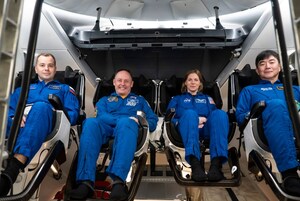
HUNTSVILLE, Ala., May 20, 2013 /PRNewswire-USNewswire/ -- The Aerospace Club of Vanderbilt University in Nashville, Tenn., took first prize in the 2013 annual NASA Student Launch Projects challenge, in which student teams design, build and fly small rockets with science payloads to an altitude of 1 mile and return them safely to Earth.
(Logo: http://photos.prnewswire.com/prnh/20081007/38461LOGO)
After two consecutive third-place finishes, Vanderbilt beat 35 other colleges and universities to win the $5,000 top prize, provided by ATK Aerospace Group of Promontory, Utah. The University of Louisville in Kentucky and Tarleton State University in Stephenville, Texas, won second and third place, respectively, in the April 21 "launch fest" at Bragg Farms in Toney, Ala., near NASA's Marshall Space Flight Center in Huntsville.
After months of preparation, each team had an opportunity to launch its rocket and payload. NASA judges evaluated the rocket designs based on a series of technical design reviews, the results from the rocket's flight including altitude, and the operation of the payload. The judges also evaluated each team's written report and its outreach activities including a website documenting the experience and local educational engagement campaigns to share their enthusiasm for rocketry. The challenge seeks to inspire younger students to pursue technical learning fields, including science, technology, engineering and mathematics (STEM).
"This program is a valuable tool for students and their teachers because they use all the knowledge gained in a classroom setting to tackle a real-world challenge," said Tammy Rowan, manager of Marshall's Academic Affairs Office, which manages the rocketry challenge. "They stretch those STEM skills to create a complex machine, which could lead them to a future in the aerospace industry. Plus, their enthusiasm when they finally see their creations fly is inspirational to those who already work in the many different aspects of space exploration."
In addition to the top prize, the Vanderbilt University team also took home the Best Payload Design for the most creative and innovative payload experiment.
Third-place Tarleton State also won three additional recognitions: the Rookie Award; the Science Mission Directorate Payload Award for most creative and innovative payload design while maximizing safety and science value; and the Best Team Spirit prize, a peer award voted on by all the rocket teams.
Alabama A&M University in Huntsville won the Altitude Award for coming closest to the 1-mile mark without going over -- only 11 feet shy of 5,280 feet above ground.
The University of Louisville team won three awards: Best Vehicle Design for the most creative, innovative and safety-conscious rocket; Best Web Design; and the Education Engagement Award. The team from Mississippi State University in Starkville won the Project Review Award for their reviews and formal presentations and also finished in fifth place overall. The student teams voted the University of Nebraska in Lincoln as winner of this year's Best-Looking Rocket.
NASA's Human Exploration and Operations Mission Directorate, Science Mission Directorate and Office of Education, all in Washington, sponsor the Student Launch Projects challenge. ATK provides corporate sponsorship. The National Association of Rocketry provides technical review and launch support.
Hundreds of flight enthusiasts cheered the student rocketeers at the launch site. More than 8,000 individual viewers also watched the event live on Marshall's UStream channel. Archived launch-day coverage is available at:
http://www.ustream.tv/channel/nasa-msfc
For complete lists of participating students, visit:
http://education.msfc.nasa.gov/slp
Visit NASA Student Launch Projects on Facebook and Twitter:
http://www.facebook.com/NASAStudentLaunch and http://twitter.com/SLI_1MILEHIGH
For more information about NASA education projects, visit:
SOURCE NASA







Share this article